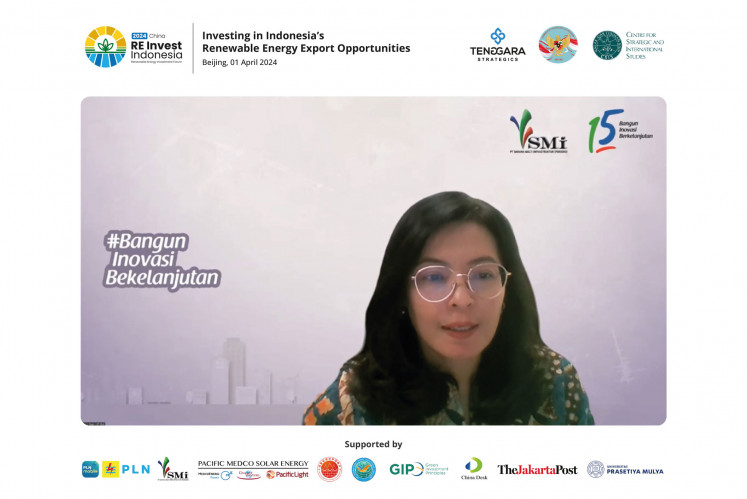Banks gear up to realize government’s vision of payment system
As Indonesia moves toward a digital economy, the government and banking sector agree on the importance of working-hand-in hand to drive the digital transformation.
Change Size

A
s Indonesia moves toward a digital economy, the government and banking sector agree on the importance of working-hand-in hand to drive the digital transformation. OJK projected Indonesia to be at the top position for the digital economy in Southeast Asia by 2025 with digital transactions' value reaching US$124 billion (IDR1,736 trillion).
The digitalization of the economy has become inevitable, with the pandemic accelerating the digital adoption. According to a research report from Google, Temasek and Bain & Company, Indonesia has seen 21M new digital consumers since the start of the pandemic.
This leap surely challenges companies’ paradigm as they are striving to survive the pandemic and adapting to the new era of consumers.
Government’s Vision for Future
The government has been responsive and proactive in the response of the digital new normal. These challenges have prompted the government, through Bank Indonesia (BI), to issue the 2025 Indonesia Payment System Blueprint (BSPI 2025) to support the integration of the national digital economy and finance, to reflect the changing industry and consumer landscape.
BSPI 2025, which was launched in 2019, presents the orientation of payment system policy at BI in order to navigate the payment system industry in the era of the digital economy and finance.
Through the 2025 visions, BI intends to shore up the integration of national digital economy and finance; support banking digitalization; guarantee the interlink between fintech and banking; ensure there is a balance between innovation, consumer protection and healthy business competition; and safeguard national interests in cross-border digital economy and finance.
The blueprints also solidified banking industry’s role as the key driver of the payment digitalization. With established risk management system, sophisticated processes that are highly regulated, as well as readily scalable consumer servicing capabilities in place, banks serve its strategic role to help accelerate government’s digitalization agenda.
BI Governor Perry Warjiyo once said that BI would continue to encourage the digitalization of the banking industry, its interlinkages with fintech, the development of regional and national startups as well as the evolution of fast, efficient, and reliable payment system infrastructures.
Tapping into the digital synergy: The right partner for government and companies
Digital financial services have become critical enablers as customers demanded increased efficiency, speed, simplicity and a seamless, often times now, touchless, experience. A recent survey by Standard Chartered, Future Money: How COVID-19 changed our financial habits, 2020, revealed that the pandemic acted as a catalyst for the growth of online financial activity, with over half of global respondents using more online services. Fifty six percent of Indonesian consumers now prefer online purchases and payments, an increase of 16 percent from before the pandemic. An overwhelming 80 percent of Indonesians also expect the country to go fully cashless by 2025.
The most recently rolled out BI initiative regarding digital payment system infrastructure is BI-Fast, which was developed to support industrial consolidation and end-to-end integrated digital economy and finance (EKD), a national step to realize BSPI 2025 and to respond to public demand for a fast, easy, affordable, safe and reliable payment system (Cepat Mudah, Murah, Aman, dan Handal/CEMUMUAH).
Banking industry is the key driver of the BI-Fast acceleration, with Standard Chartered taking active part in the program.
Standard Chartered’s participation plays a natural role into the government-banking industry cohesive collaboration. The Bank has had prominent roles in supporting the Indonesian government throughout its more than 150 years of presence in archipelago.
By leveraging its network, market expertise, and strong client relationships, Standard Chartered has helped attract over USD5 billion of committed foreign investments for the setup of manufacturing plants in 2019. The Bank was also the only international bank involved in all global bond transactions issued by State-Owned Enterprises (SOEs) in 2018 and it continues to play an active role in Indonesia’s capital markets in 2019 until no. Moreover, in the wake of the pandemic, the Bank also supports government programs in collaboration with the Indonesian Export Guarantee Agency (LPEI) in the form of a guarantee scheme to expand alternative funding, especially in the labor-intensive corporate sector in the context of implementing the National Economic Recovery (PEN) program. Thus, the Bank’s participation in BI-Fast program is natural progression of the synergy and its unbent support to realize the vision of digital finance.
Standard Chartered’s proven track record in supporting government’s agendas provides a solid base for the collaboration under government’s digital agenda, which is also important to offer basis for companies to leverage as a steppingstone to tap into the digital economy potentials.
The Bank’s latest foray in the digital sphere through its, Banking-as-as-Service (BaaS) offering, Standard Chartered nexus, showcases its commitment to leverage digital as a tool to drive financial inclusion, also a top government agenda. By forming a partnership with Bukalapak, one of the country’s unicorn players, the low hanging fruit is a massive outreach to offer Bukalapak’s extensive 100 million users and 13.5 million sellers an easy, reliable and bank-backed financial services.
As banks, like Standard Chartered, having been consistent in supporting the government’s digitalization agenda, companies can easily opt to tap into this government-banking industry synergy. With a number of banking solutions that are designed to ease the cash and payment digital transformation, companies are left with no excuse not get in the digital fast track as 96% Indonesian consumers now use the digital services and 99% intend to continue using it forward (according to Google-Temasek-Bain data).
How can companies make best of the digital solutions that banks offer to keep themselves relevant as they brace the impact that the pandemic has brought to payment and the future of money?
Read more here: Pandemic, payments and the future of money









